Swimming Australia Review Leads To Apology Over Abuses Of Girls & Women As Report Recommends Ban On Skinfold Tests & ‘Unjustified Screening’
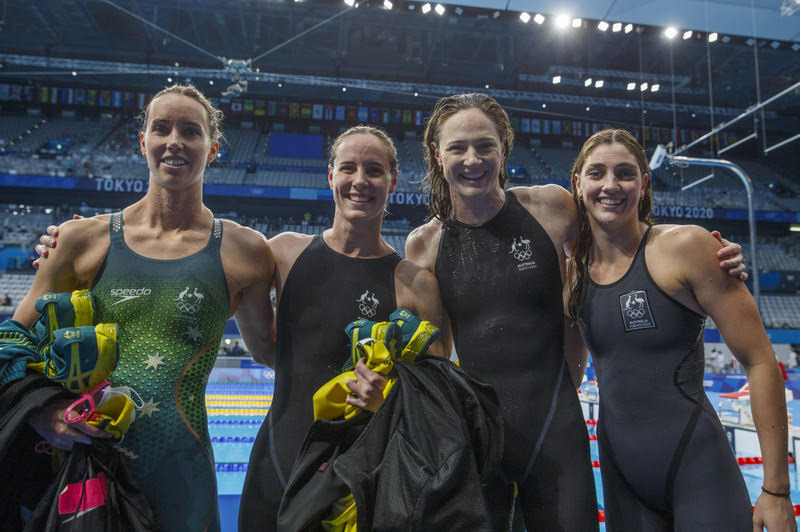
Swimming Australia has acknowledged and apologised for the various forms of abuse – none defined as sexual – endured by girls and women under its jurisdiction.
In welcoming a report from independent investigators into abuse claims, Swimming Australia president Kieren Perkins, the 1992 and 1996 Olympic 1500m freestyle champion, nodded to a point Madeline Groves made when she withdrew from Olympic trials last year. He appealed to his community to drop the notion that the matter was ‘historic’, saying:
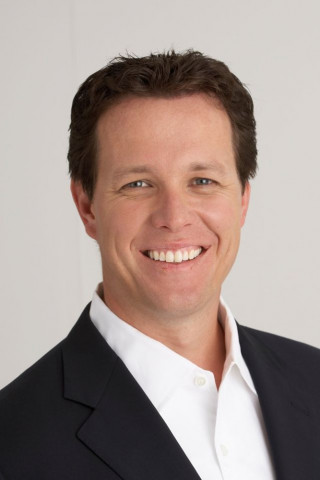
“It‘s not historical. It’s what’s happening today. It’s not acceptable and we have to start owning that culture and working on it.”
Kieren Perkins
Perkins, head off a sport that celebrated Australia’s finest Olympic team outcome in the pool on the back of the success of its women’s team, spoke as he delivered the findings of independent investigators who looked into Swimming Australia’s treatment of women and girls.
The three panellists – Chris Ronalds, Katherine Bates and professor Alex Parker – were scathing in their assessment of the sport’s cultural problems. They painted a picture of a sport with its head in the sand, the canvas something of a mirror image of the state of swimming in international governance for several decades, including a woeful lack of silence by Australia’s representatives at FINA, the global regulator, on issues that directly impact athlete welfare, both sexes.
The investigators heard from more than 150 participants, including former and current athletes, parents, coaches, technical officials, volunteers and administrators.
In their final report, which they handed over to Swimming Australia late last year, they included 46 recommendations which left no doubt about the extent of the sport’s chauvinistic cultural problems.
In response to those, Swimming Australia stated:
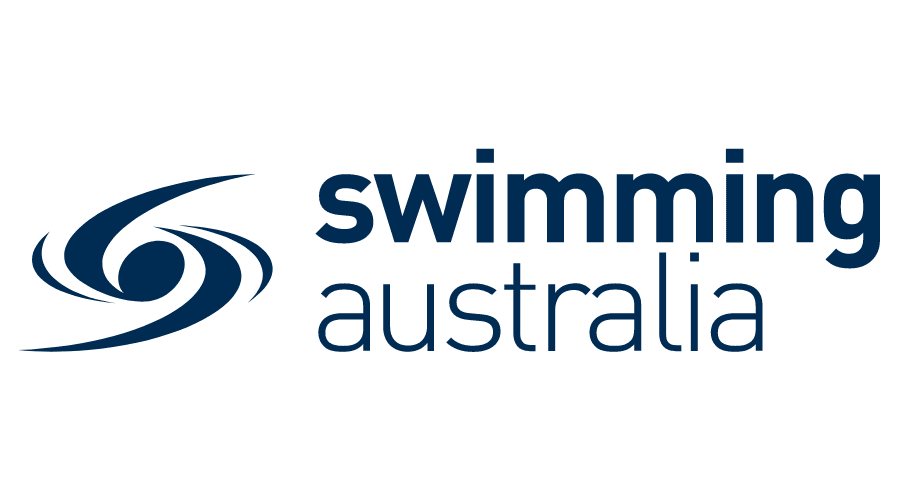
“Swimming Australia wants to reassure those who came forward that the sport is committed to change to ensure these negative experiences are not repeated and apologises unreservedly to those impacted.
“The report also identified issues that affect athlete experiences and wellbeing at all levels of the sport, including a fear and pressure to perform, speaking out, and more broadly control and the coaching culture.”
“It is acknowledged that, particularly for young female athletes, some of their experiences have had longer term impacts. Swimming Australia again unreservedly apologises to those members of the swimming community who have had a negative experience.”
Swimming Australia
Down the years, there have been cries for help from champion swimmers including Cate Campbell, Maddie Groves and Emily Seebohm, while Leisel Jones described in damning terms her autobiography Into the Depths the culture she endured on the way to the top and during her years of winning prizes for self and Australia. Those generations of swimmers thought the day would never come when the culture would be forced to change and embrace that change.
The report highlights some of the very issues Jones raised all those years ago, including an “obsession” with physical screening and skin fold tests, though her main beef was the way that process was then handled in a group and how the vital statistics of women athletes were called out in the group and used to belittle, cajole and ridicule.
As News Corp’s Julian Linden writes today: “For the survivors, and the courageous whistleblowers who have been let down by the system, that was something they never thought they would hear.”
A Ban On Skinfold Tests?
One recommendation in the report urges Swimming Australia to “challenge the misinformed view that lean body mass predicts performance”. Highlighting the points Leisel Jones made long ago, swimming should, instead, develop “training in using humanising and non-objectifying language in managing body image concerns,” the report states.
It also takes issue with the use of the word ‘physique’ and runs the risk of having tipped too far across a line when it comes to calling things as they are in a performance-sports world that takes no prisoners come race day. The report notes: “The term ‘physique’ has meaning and consequences, including overvaluing body shape and size in terms of their impact on performance.”
Bill Sweetenham, a coach mentor and leadership figure for decades in swimming, long ago made the same point when he noted that swimming was missing a trick if it failed to understand “that the bumble bee looks for all the world like it could never fly – but it does!”
The report recommends that “unjustified routine periodic screening”, saying body composition assessments should only be conducted twice a year unless there is a “justified need”.
It says SA should “demonstrate clear leadership” by banning “the use of surface anthropometry, specifically skin folds, as a measure of body composition at any stage of a swimmer’s career”.
It will be for the implementation committee to talk to coaches and athletes, physiologists and sports scientists to discuss why those things recommended for banning may or may not be relevant yet in performance sport.
Dr Michelle Gallen, who was appointed chair of the steering committee charged with action on the report, said the intention was to implement all 46 recommendations, hopefully before the Paris 2024 Olympic Games. She said:
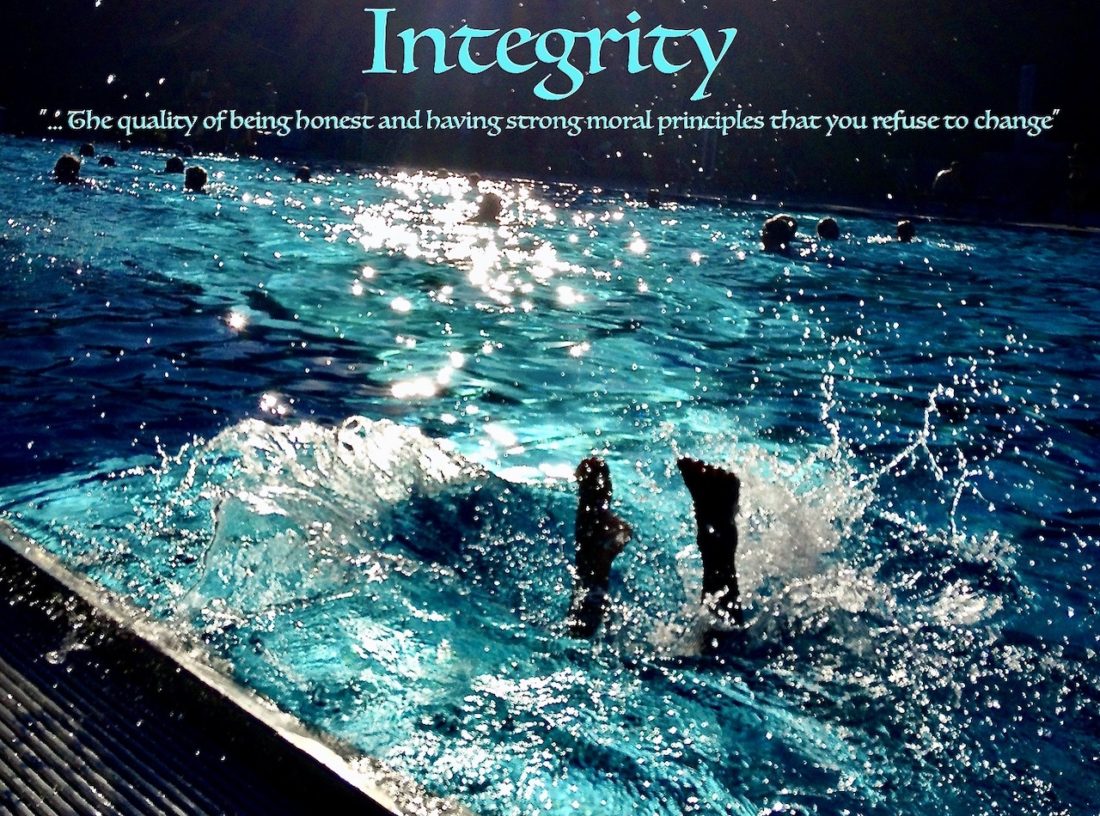
“We will address every single one of them. Some of them are very detailed so we will work through them over time. I don‘t have a time frame yet because the committee only met very briefly for the first time yesterday, but once we have a timeline for how we’ll address them, we will also publish that and we are committed to implementing all of them.”
Dr Michelle Gallen
One recommendation will not be enacted, on grounds that to publish the report in full would identify witnesses who, by agreement, had given their testimony in confidence. Perkins explained: “The board has had that discussion. It was very robust. It lasted almost four hours and the reality is that one of the core tenets of the formation of the independent panel was to ensure the confidentiality of those who did put forward their stories.”
He added: “The reality for us is that in a sport that is a big sport, but it‘s also a small sport, too much of the detail in the report would be easily identifiable, connected to individuals that we know and we don’t think that there is any positive benefit to be gained by putting those people at risk of attention for what ultimately was always promised as an opportunity for them to confidentially put forward their view to an independent panel so that change could occur.”
Perkins confirmed there were no reports of any sexual abuse in a review that looked at the past five years. He was, however, shocked by some of the findings and the persistence of behaviour that he had thought long dead and buried. He said:
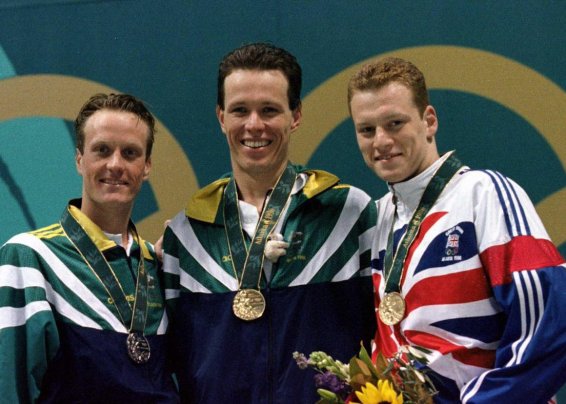
“For me, what was challenging to read in it was there‘s elements of it that’s like reading and reliving your own childhood. There was a number of things in there which I identified with personally and were not at all surprising. But if I‘m honest, the big surprise for me, or the challenge for me, is that there’s a lot of behaviours that did happen historically.
“As you grow up yourself and as you move into different areas of life, you think that these things were left behind and that the sport has matured and grown and is moving with the 21st century into a more enlightened way of understanding how you deal with and support young people to have a positive experience in sport.
“And unfortunately, there‘s just too many examples of where that culture hasn’t evolved and it hasn’t modernised.”
Kieren Perkins – image – Racing days: the 1996 Olympic 1500m free podium, Kieren Perkins, centre, Australian teammate Daniel Kowalski, and Britain’s Graeme Smith
Those words resonate far beyond Australia and its shores, to a world of swimming still struggling to confront the abuses women have endured without support of authorities largely run by men. Dip well back beyond the past five years and we land in the murky depths of decades during which women and girls came forward to report abuse, including sexual abuse, but were told, even in some cases by police authorities, to “go home … and don’t embarrass your family”.
In the United States, knowledge of abuse dated back at least 20 years by the time an Abuses Committee at USA Swimming made Safe Sport recommendations that were then ignored for another 20 years before survivors of the abuse and their lawyers made that position unsustainable.
Long in denial and, like many of its peer organisations, more comfortable with turning a blind eye to shameful problems within its sport, at home and abroad, rather than confront and deal with the truth, Swimming Australia took a big stroke in the right direction today.
The Swimming Australia Response To Key Recommendations
- Swimming Australia issues a public statement acknowledging the harm that body shaming does to swimmers
- Swimming Australia commits to never again selecting all-male coaching teams for national and international competitions with a minimum of two women coaches picked
- Swimming Australia publishes an annual report revealing exactly how many integrity complaints it received and how they were investigated
- Swimming Australia develops a policy to investigate integrity issues involving staff and coaches without the need for a formal complaint to be made
- When selecting coaches, Swimming Australia prioritises behavioural standards over their performance standards
- Skin fold tests to be banned
- All coaches and support staff required to complete a mental health first aid training course and content specific to female specific health concerns
- Coaches must have insurance, including a minimum of $20 million for public liability
- Swimming Australia to develop a process to acknowledge and address serious integrity concerns that are aired in public, including social media
- Swimming Australia should strongly consider publicly releasing the full independent report
Swimming Australia noted in its statement, in full below): “The feedback was open and frank and there were experiences recounted that were difficult to read.
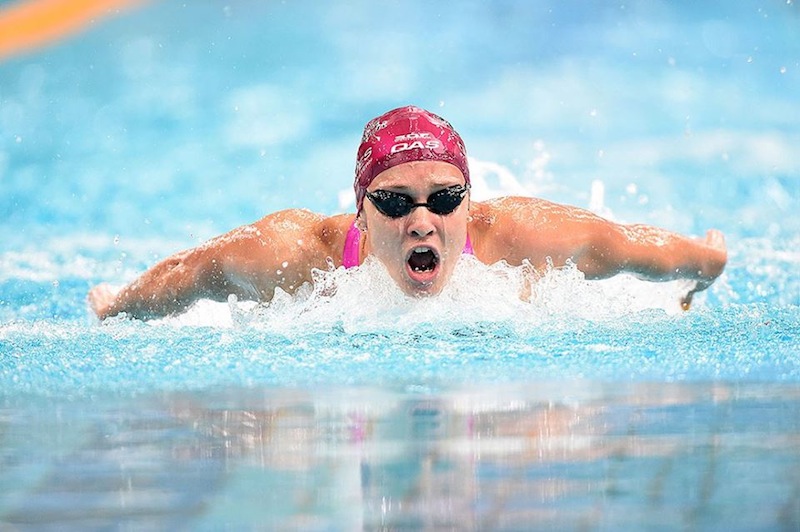
“Swimming Australia wants to reassure those who came forward that the sport is committed to change to ensure these negative experiences are not repeated and apologises unreservedly to those impacted.
“The report also identified issues that affect athlete experiences and wellbeing at all levels of the sport, including a fear and pressure to perform, speaking out, and more broadly control and the coaching culture.”
“It is acknowledged that, particularly for young female athletes, some of their experiences have had longer term impacts. Swimming Australia again unreservedly apologises to those members of the swimming community who have had a negative experience.”
Swimming Australia – image, Madeline Groves, courtesy of Swimming Australia
The Swimming Australia statement in full:
Swimming Australia response to the Independent Panel report
In June 2021, Swimming Australia commissioned an independent report to better understand the experiences of women and girls within the sport. With female involvement at 60% of the 6 million participant base, this was a critical step in enabling a positive experience for all.
The Independent Panel’s report and recommendations have now been received and Swimming Australia is very grateful to the Panel and the participants who came forward to share their experiences.
The feedback was open and frank and there were experiences recounted that were difficult to read. Swimming Australia wants to reassure those who came forward that the sport is committed to change to ensure these negative experiences are not repeated and apologises unreservedly to those impacted.
The Independent Panel was tasked with a solution-focussed inquiry to understand issues facing participants in swimming within a performance environment.
The key areas of inquiry included:
- The current structures and systems within Australian swimming that influence and impact the experience of participants, particularly girls and women in swimming
- The overall experiences of swimmers in relation to the behaviours, conduct and practices of persons in positions of authority
- The impact on the experience of women and girls of having few or no female coaches in the swimming environment
- The communication to female swimmers by coaches and others about physiological benchmarks of elite sport such as weight, skin folds and body shape and the psychological impact that has on the wellbeing of swimmers
- The effectiveness of the current complaints process, including any perceived or real barriers to making complaints or the handling of any complaints.
The six month review was comprehensive, with more than 150 participants spanning former and current athletes, parents, coaches, technical officials, volunteers and administrators.
In accordance with the Terms of Reference, the Independent Panel of Chris Ronalds AO SC, Ms Katherine Bates OLY and Professor Alexandra (Alex) Parker submitted their confidential written report to the Chairs of Swimming Australia and the Australian Sports Commission on 17th December 2021. The Panel recently presented findings to the full Swimming Australia Board.
Broadly, the review found that Swimming Australia must address the coaching gender imbalance, coaching culture, education and accreditation, governance structures, and the complaints process.
The key findings and recommendations from the report cover a range of themes including:
- Systems, structures and processes
- Coach accreditation and education
- Assessment and management of body composition
- Cultural change and leadership
- The complaints process
The report also identified issues that affect athlete experiences and wellbeing at all levels of the sport, including a fear and pressure to perform, speaking out, and more broadly control and the coaching culture. It is acknowledged that, particularly for young female athletes, some of their experiences have had longer term impacts. Swimming Australia again unreservedly apologises to those members of the swimming community who have had a negative experience.
A total of 46 recommendations were identified by the Independent Panel. Swimming Australia commits to addressing each and every recommendation from the Independent Panel report. In the interests of transparency and accountability, the full list of recommendations are available here and will remain on the Swimming Australia website and be updated as progress is made in each of these areas. Swimming Australia considers that the report and recommendations will provide a strong roadmap for the organisation to improve across all five key themes identified in the report.
While a number of recommendations have highlighted areas in which Swimming Australia requires significant work, there are a number of recommendations where progress has already been made. These include Women in Performance Coaching programs, the agreement to adopt the Sport Integrity Australia National Integrity Framework with a full suite of policies and procedures, including the independent complaint handling process, and the Female Performing Physique program, that takes into consideration positive psychology, risk of disordered eating/eating disorders, positive language and culture, LEA and RED-s consequences, measurement and monitoring as part of the workshop based education program for coaches. Swimming Australia also has gender equality across its Board and senior management staff.
An Implementation Steering Group has been tasked with the important role of addressing these recommendations. It will be Chaired by Doctor Michelle Gallen (Director, Swimming Australia) and include Sally Howe (Director, Swimming Australia), Matti Clements (Acting CEO, AIS), Jason Hellwig (CEO, Swimming Victoria), Narelle Simpson (Former Australian Swimming Coach and Owner, NS Swim Schools), Greg Shaw (General Manager, Performance Support Swimming Australia) and Ellie Cole (four time Paralympian and Australian Swimmers’ Association Executive) with secretariat provided by Ana Croger (General Counsel, Swimming Australia). Some information on the members and their respective qualifications and experience is provided here.
Swimming Australia President Kieren Perkins said the governing body was steadfast in its commitment to enact genuine change.
“The Swimming Australia Board acknowledges the ultimate collective responsibility and commitment in addressing these recommendations rests with the Board and the Executive Team in delivering and committing to meaningful and enduring change, being transparent and regaining and earning the trust of our athletes and our entire community,” Perkins said.
“The Board is committed to leading the organisation through this process of positive cultural change. They look forward to driving long term change alongside the community including the athlete cohort, participants, parents, Member Organisations, stakeholders, coaches and staff.”
Independent Panel member, Chris Ronalds AO SC, expressed the Panel’s gratitude to all those who participated in the review and supported Swimming Australia’s path forward to meaningful change.
“We’d like to thank everyone who came forward with their submissions and gave us their time to talk through their experiences. We acknowledge their courage for agreeing to talk with us,” Ronalds AO SC said.
“We’re very encouraged after our conversation with Swimming Australia that they are committed to taking these steps towards creating positive change. We acknowledge the Swimming Australia Board and their openness in listening to our findings and creating accountability around the implementation of the recommendations to ensure the sport and all participants are in the best place moving forward.”
The Implementation Steering Group will meet regularly to ensure each recommendation is thoroughly reviewed with a plan of action and timeline documented, with the initial meeting being scheduled for late January. They will hold the Swimming Australia Board and Executive to account for the implementation.
With a number of the recommendations including the grassroots and junior levels of the sport, the Implementation Steering Group and Swimming Australia also look forward to working with state & territory associations, clubs, the athlete and coach community and key stakeholders at the Australian Sports Commission and Sport Integrity Australia as part of this process.
While Swimming Australia cannot release the full report due to the confidentiality guaranteed to participants, the themes of the report are clear in the recommendations and provide public accountability for Swimming Australia’s steps forward.
The organisation appreciates that this has been a challenging time for athletes, coaches, staff and the broader community. Swimming Australia thanks everyone that has contributed and remains resolute in its commitment to continually improving the sport to ensure it is a safe and thriving environment for all participants from grassroots through to the elite level.
Support for participants continues to be made available. If participants or any member of the swimming community would like support or to report any matters, please contact the free and confidential AIS Be Heard hotline (1800 565 965), email (aisbeheard@coreintegrity.com.au) or ais.gov.au/AISBe-Heard